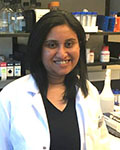We’re taking time over the following weeks to get to know the members of the GSA’s Early Career Scientist Committees. Join us every week to learn more about our early career scientist advocates.

Sonali Majumdar
Career Development Subcommittee
Memorial Sloan Kettering Cancer Center
Research Interest
The brain is a complex organ, and many of its cellular and molecular properties remain a mystery. To ultimately solve the mysteries surrounding the molecular basis of neurodegenerative conditions and enable the design of targeted molecular therapies, we must first understand how genes are expressed within the brain during development. I study the distinct molecular patterns observed during brain development by following RNAs.
RNAs are the creative and resourceful siblings of DNA. Messenger RNAs transcribe the language hidden in genes and are necessary for generating proteins. The majority of RNAs play roles that regulate patterns of gene expression and can therefore provide important clues about brain development. For instance, the same RNA can be processed in multiple ways, thus generating different isoforms. Distinct profiles of processed RNA isoforms are observed in the brain through different developmental stages. This observation has inspired investigations on the mechanisms by which brain-specific RNA isoforms are generated and on their direct role in brain development. To determine the underlying molecular mechanisms of biogenesis, I study protein machineries that mediate distinct RNA processing during brain development.
As a PhD-trained scientist, you have many career options. What career paths interest you the most?
Through volunteer experiences, I’ve come to identify my passion in enhancing the training experience of scientists outside the rigors of their research niche. Scientists are primarily trained for academic careers during their PhD and postdoctoral training; however, only a minority will work in tenure-track faculty positions. Because of this, it’s prudent to prepare scientists for a range of career options. Working to address this need has inspired me to explore opportunities in career development.
I’m currently exploring this career pathway at Memorial Sloan Kettering’s Postdoctoral Association, where I assist the Career Development Office. In this role, I assess the professional development needs of postdocs, organize networking events and symposia, and foster peer mentoring. I also volunteer with the team at New York City Postdoc Coalition, where I connect postdocs from seven biomedical institutes in the city, promote citywide career development opportunities, and facilitate open conversations on challenges facing postdocs in New York City.
These experiences have reaffirmed my interest in pursuing a career where I can continue to invest my time and energy in improving the training experience for early career scientists.
In addition to your research, how else do you want to advance the scientific enterprise?
During my time at MSK, I recruited a peer group to initiate the science outreach committee of our Postdoctoral Association. For the first project, I developed a science communication and public engagement series called Community Conversations Café with the local branch of New York Public Library. It served as a platform for scientists to communicate the biological basis of and current advancements towards the healthcare therapies being discussed (e.g. mental health and aging, nutrition and obesity, anxiety and depression). Community members shared stories highlighting the challenges and struggles of coping and caregiving.
We all learned a lot from the exchanges, and the experience strengthened my enthusiasm for creating more science communication opportunities. Throughout my career, I want to foster communication between scientists and nonscientists to dispel fear and misinformation related to health topics. I believe that this type of communication can help people differentiate between evidence-based scientific studies and pseudoscience.
As a leader within the Genetics Society of America, what do you hope to accomplish?
I begin my journey as an early career leader in the GSA with the overarching goal of providing equitable access to career development opportunities for GSA members—especially for those who do not have established career support offices at their universities or research institutes. I look forward to expanding awareness of different career paths for scientists through contributing to the Decoding Life interview series. I aim to further this contribution by connecting early career scientists with career development professionals when they need career advice or help with exploration and transition strategies. I’d also like to host a virtual workshop to encourage early career scientists to organize Career Development Symposia, which the GSA awards grants for.
Previous leadership experience
- Board Member—Memorial Sloan Kettering Postdoctoral Association
- Chair, Science Outreach Committee—Memorial Sloan Kettering Postdoctoral Association
- Member, Career Development Committee—Memorial Sloan Kettering Postdoctoral Association
- Board Member—New York City Postdoctoral Association
Contact
- Twitter: @Sonali19281













